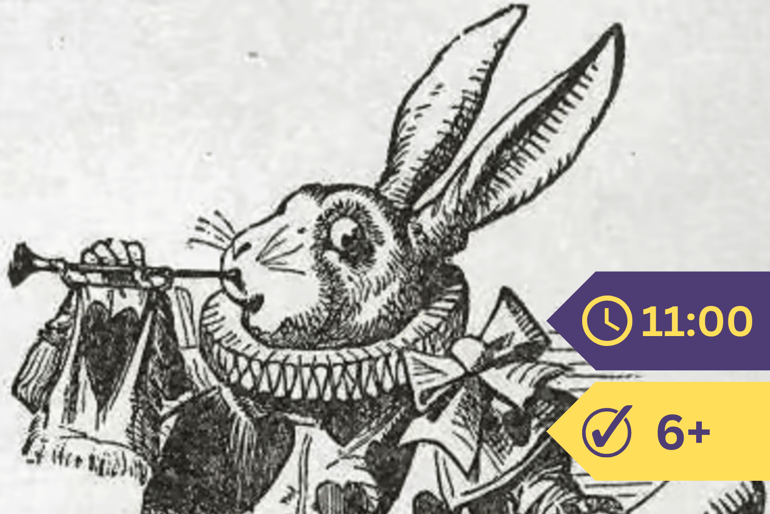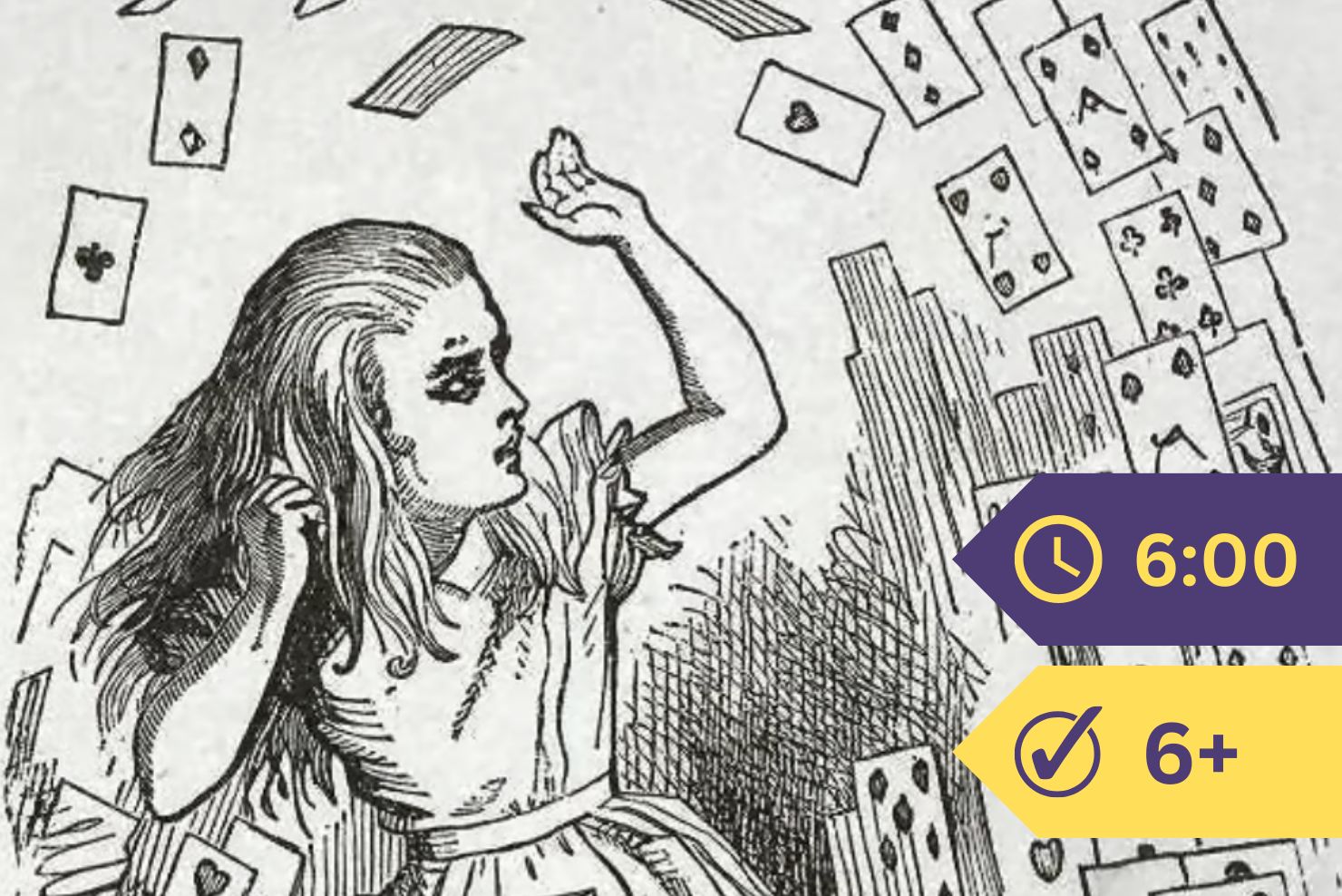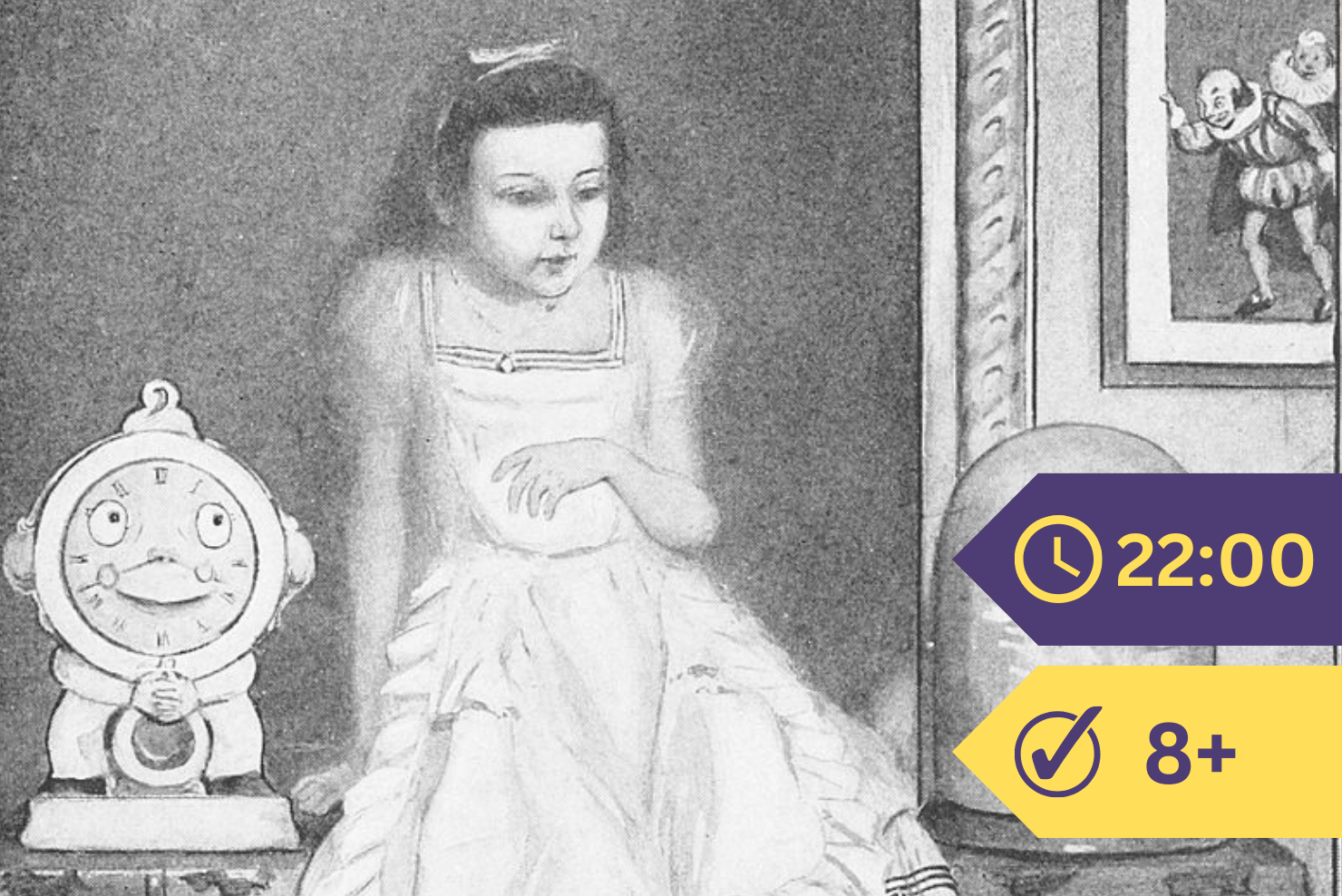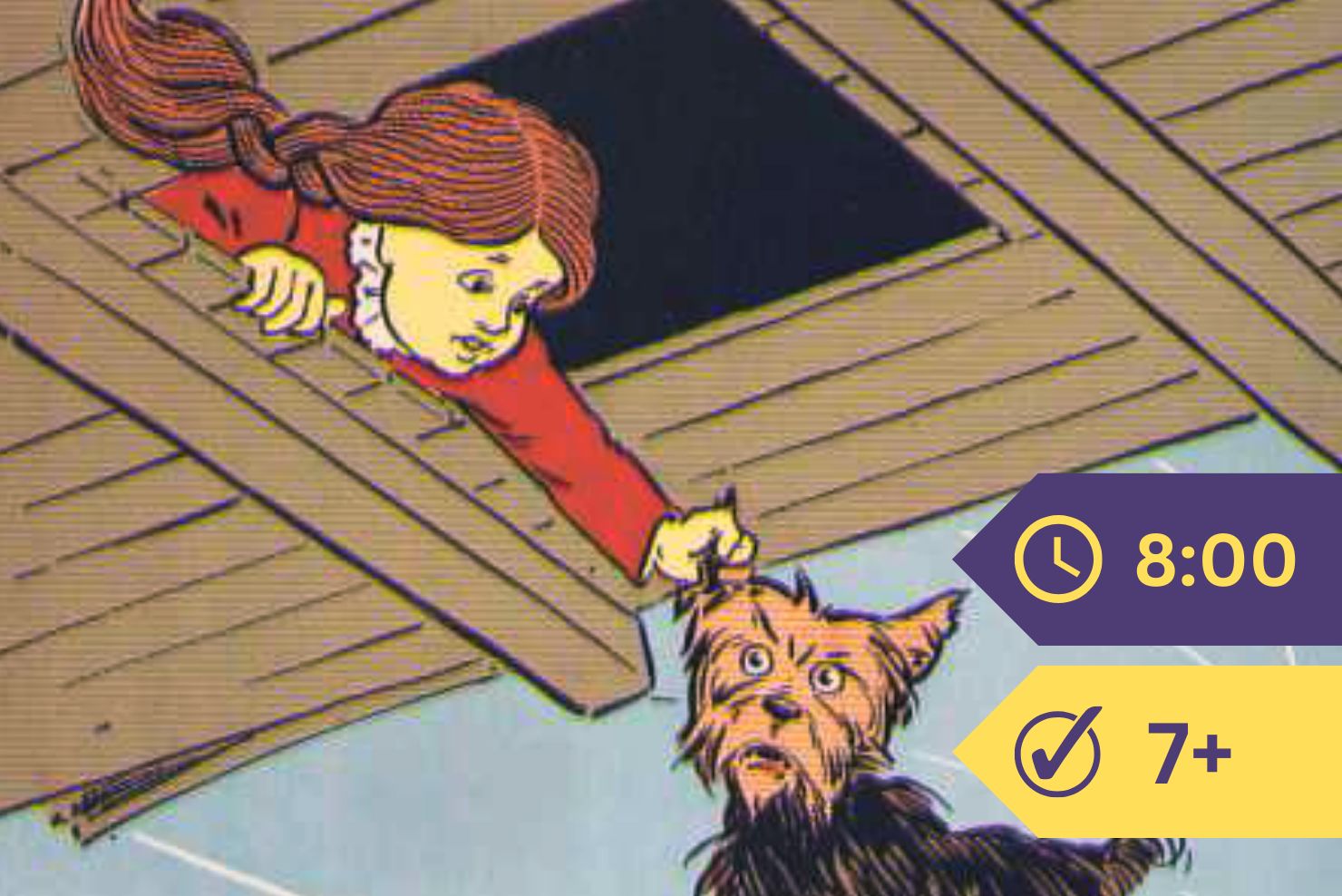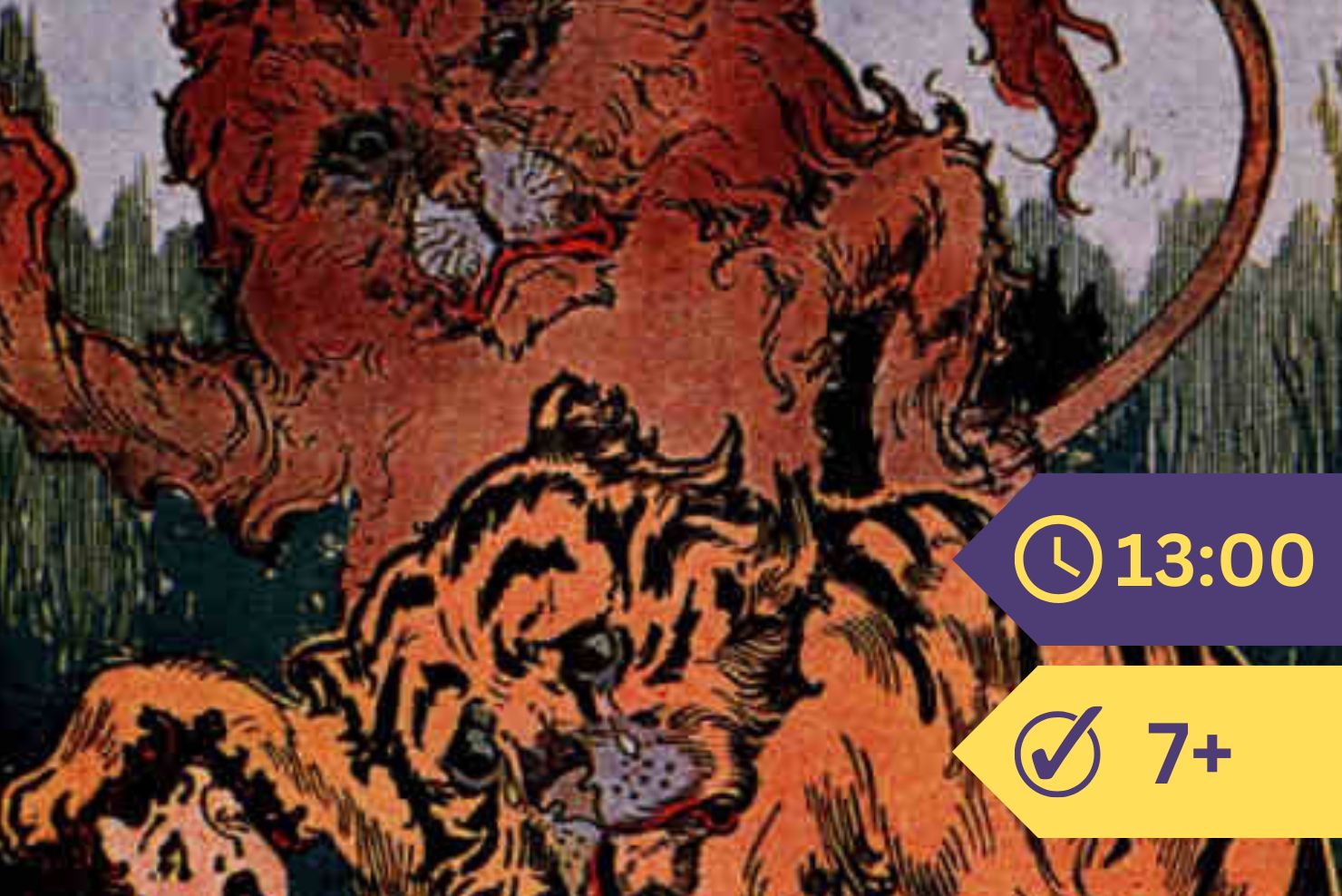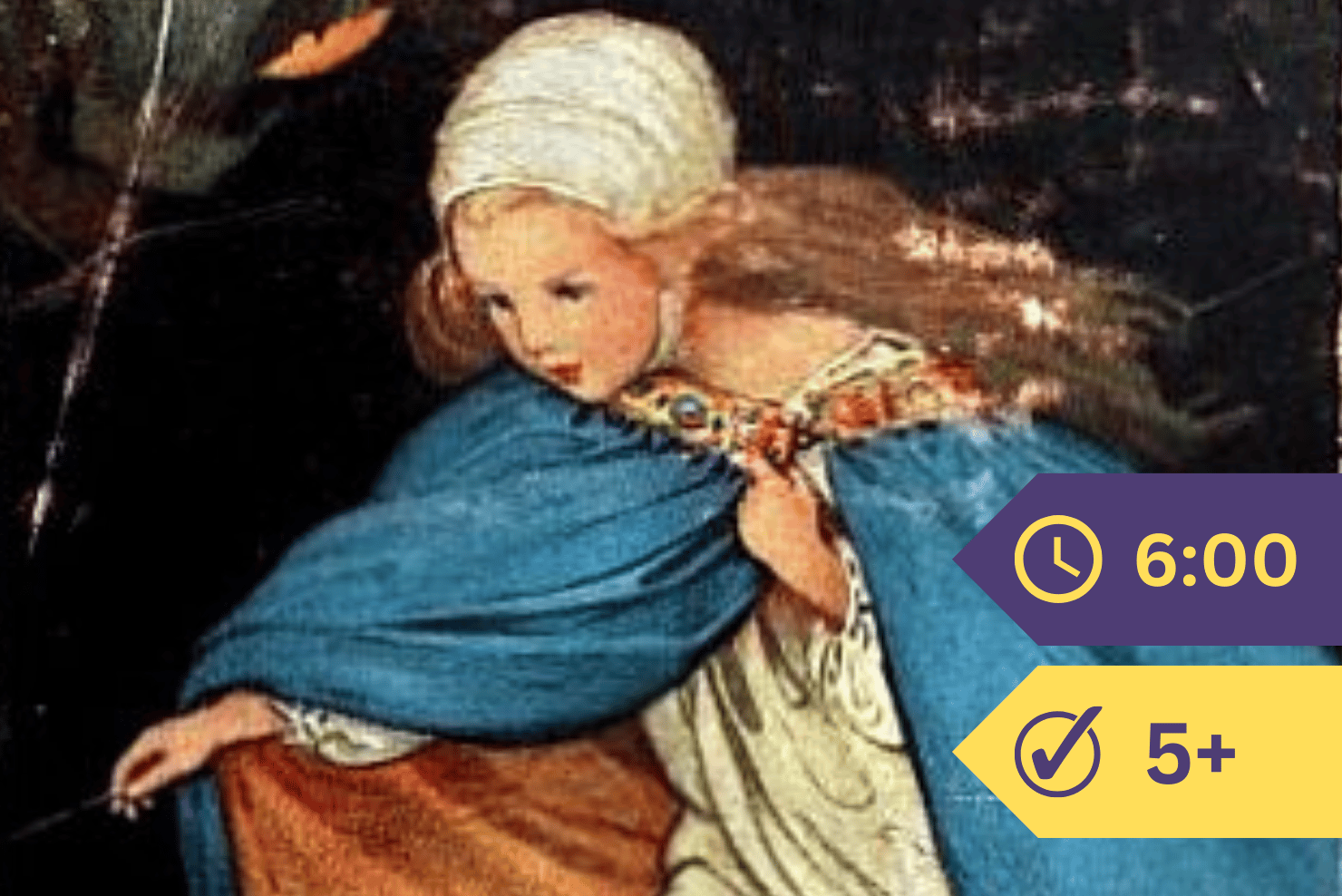The King and Queen of Hearts were seated on their throne when Alice and the Gryphon came up, with a great crowd about them. There were all sorts of small birds and beasts, as well as the whole pack of cards. The Knave stood in front of them in chains, with a soldier on each side to guard him; and near the King was the White Rabbit, with a trumpet in one hand and a roll of paper in the other. In the middle of the court was a table with a large dish of tarts on it. They looked so good that it made Alice feel as if she would like to eat some of them. “I wish they’d get the trial done,” she thought, “and hand round the pies!” But there seemed no chance of this, so to pass the time away she looked round at the strange things around her.
This was the first time Alice had been in a court of this kind, and she was quite pleased to find that she knew the names of most things she saw there. “That’s the judge,” she thought, “I know him by his great wig.”
The judge, by the way, was the King, and as he wore his crown on top of his wig, he looked quite ill at ease.
“And that’s the jury box,” thought Alice, “and those twelve things” (she had to say “things,” you see, for some of them were beasts and some were birds), “I guess are the jurors.” She said this last word two or three times as she was proud that she knew it; for she was right when she thought that few girls of her age would have known what it all meant.
The twelve jurors all wrote on slates.
“What can they have to write now?” Alice asked the Gryphon, in a low tone. “The trial has not begun yet.”
“They’re putting down their names,” the Gryphon said, “for fear they should forget them.”
“Stupid things!” Alice said in a loud voice, but stopped at once, for the White Rabbit cried out, “Silence in court!” and the King looked round to make out who spoke.
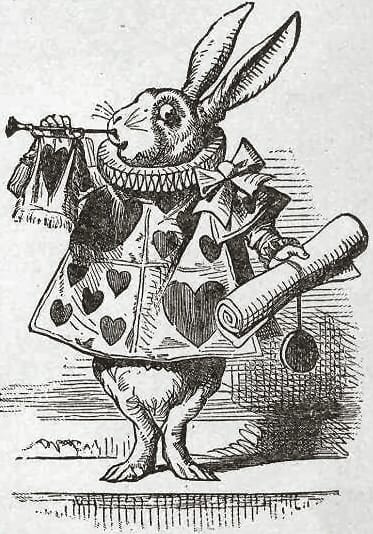
Alice could see quite well that the jurors all wrote down “stupid things!” on their slates, she could even make out that one of them didn’t know how to spell “stupid” and that he asked the one by his side to tell him, “A nice muddle their slates will be in by the time the trial’s ended,” thought Alice.
One of the jurors had a pencil that squeaked as he wrote. This, of course, Alice could not stand, so she went round near him, and soon found a chance to get it from him. This she did in such a way that the poor juror (it was Bill, the Lizard) could not make out at all where it was, so he wrote with one finger for the rest of the day. Of course, this was of no use, as it left no mark on the slate.
“Read the charge!” said the King.
On this the White Rabbit blew three blasts on the trumpet, and then from the paper in his hand read:
“The Queen of Hearts, she made some tarts,
All on a summer day:
The Knave of Hearts, he stole those tarts,
And took them quite away!”
“The jury will now take the case,” said the King.
“Not yet, not yet!” the Rabbit said in haste. “There is a great deal else to come first.”
“Call the first witness,” said the King, and the White Rabbit blew three blasts on the trumpet, and called out, “First witness.”
The first to come was the Hatter. He came in with a tea cup in one hand and a piece of bread and butter in the other.
“I beg pardon, your majesty,” he said, “but I had to bring these in, as I was not quite through with my tea when I was sent for.”
“You ought to have been through,” said the King. “When did you begin?”
The Hatter looked at the March Hare, who had just come into court, arm in arm with the Dormouse. “Fourth of March, I think it was,” he said.
“Fifth,” said the March Hare.
“Sixth,” added the Dormouse.
“Write that down,” said the King to the jury, and they wrote down all three dates on their slates, and then added them up and changed the sum to shillings and pence.
“Take off your hat,” the King said to the Hatter.
“It isn’t mine,” said the Hatter.
“Stole it!” cried the King, as he turned to the jury, who at once wrote it down.
“I keep them to sell,” the Hatter added. “I’ve none of my own. I’m a hatter.”
Here the Queen put on her eyeglasses and stared hard at the Hatter, who turned pale with fright.
“Tell what you know of this case,” said the King; “and don’t be nervous, or I’ll have your head off on the spot.”
This did not seem to calm him at all, he shifted from one foot to the other and looked at the Queen, and in his fright he bit a large piece out of his teacup in place of the bread and butter.
Just then Alice felt a strange thrill, the cause of which she could not make out till she saw she had begun to grow again.
“I wish you wouldn’t squeeze so,” said the Dormouse. “I haven’t room to breathe.”
“I can’t help it,” said Al-ice; “I’m growing.”
“You’ve no right to grow here,” said the Dormouse.
“Don’t talk such nonsense,” said Alice. “You know you grow too.”
“Yes, but not so fast as to squeeze the breath out of those who sit by me.” He got up and crossed to the other side of the court.
All this time the Queen had not left off staring at the Hatter, and just as the Dormouse crossed the court, she said to one of the men, “Bring me the list of those who sang in the last concert,” on which the poor Hatter trembled so, that he shook both his shoes off.
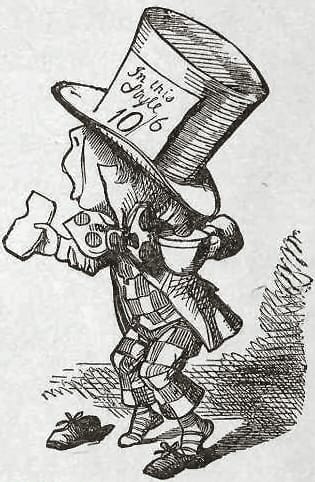
“Tell what you know of this case,” the King called out again, “or I’ll have your head off, if you do shake.”
“I’m a poor man, your majesty,” the Hatter began in a weak voice, “and I hadn’t but just begun my tea, not more than a week or so, and what with the bread and butter so thin—and the twinkling of the tea—”
“The twinkling of what?” asked the King.
“It began with the tea,” the Hatter said.
“Of course twinkling begins with a T!” said the King. “Do you take me for a dunce? Go on!”
“I’m a poor man,” the Hatter went on, “and most things twinkled after that—but the March Hare said—”
“I didn’t,” said the March Hare in great haste.
“You did,” said the Hatter.
“I deny it,” said the March Hare.
“He denies it,” said the King: “leave out that part.”
“Well, I’m sure the Dormouse said—” the Hatter went on, with a look at the Dormouse to see if he would deny it too, but he was fast asleep.
“Then I cut some more bread and—”
“But what did the Dormouse say?” asked one of the jury.
“That I can’t tell,” said the Hatter.
“You must tell or I’ll have your head off,” said the King.
The wretched Hatter dropped his cup and bread, and went down on one knee.
“I’m a poor man,” he began.
“You’re a poor speaker,” said the King.
Here one of the guinea pigs cheered, and one of the men seized him, thrust him into a bag which tied up with strings, and then sat upon it.
“If that’s all you know, you may stand down,” the King said.
“I’m as low as I can get now,” said the Hatter; “I’m on the floor as it is.”
“Then you may sit down,” the King said.
“I’d like to get through with my tea first,” said the Hatter with a look at the Queen who still read the list in her hand.
“You may go,” said the King, and the Hatter left the court in such haste that he did not even wait to put his shoes on.
“And just take his head off outside,” the Queen added to one of the soldiers, but the Hatter was out of sight before the man could get to the door.
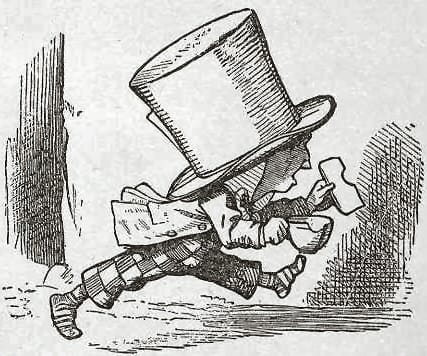
“Call the next witness,” said the King.
The next to come was the Duchess’ cook, and Alice guessed who it was by the way the people near the door sneezed all at once.
“Tell what you know of this case,” said the King.
“Shan’t,” said the cook.
The King looked at the White Rabbit, who said in a low voice, “Your majesty must make her tell.”
“Well, if I must, I must,” said the King with a sad look. He folded his arms and frowned at the cook till his eyes were almost out of sight, then asked in a stern voice, “What are tarts made of?”
“Pepper, mostly,” said the cook.
“Sugar,” said a weak voice near her.
“Catch that Dormouse,” the Queen shrieked out. “Off with his head! Turn him out of court! Pinch him! Off with his head!”
The whole court ran here and there, getting the Dormouse turned out, and by the time this was done, the cook had gone.
“That’s all right,” said the King, as if he were glad to be rid of her. “Call the next,” and he added in a low tone to the Queen, “Now, my dear, you must take the next witness in hand; it quite makes my head ache!”
Alice watched the White Rabbit as he looked over the list. She thought to herself, “I want to see what the next witness will be like, for they haven’t found out much yet.”
Think, if you can, how she felt when the White Rabbit read out, at the top of his shrill little voice, the name “Alice!”

